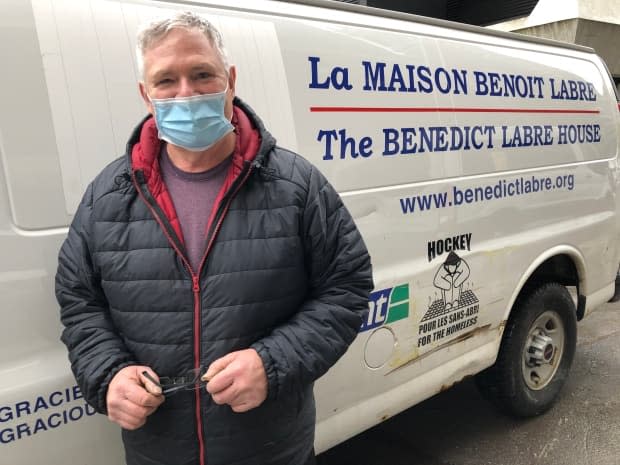This van doesn't look like much, but it is the beating heart of a Montreal food bank
It's rusty and deteriorating by the day, but make no mistake: this 2007 GMC Savana is the unsung hero of the Benedict Labre House's food bank in Saint-Henri.
In honour of its resilience, the vehicle has been given an affectionate nickname. Sweet Baby.
For years now, staff and volunteers have piled into Sweet Baby several times a week for pick-ups at Moisson Montréal, helping them prepare food baskets for their clients. That the food bank can't survive without its creaky vehicle illustrates the wider struggle that often accompanies helping those in need.
The van is a mess. The brakes are all but done and the transmission could go at any moment.
"When you look down, in parts of the van, you can see the ground so it's reminiscent of The Flintstones," said Francine Nadler, the clinical coordinator at the Benedict Labre House.
Each ride could be Sweet Baby's last, which is why Nadler developed a superstitious ritual of sorts before cranking the engine.

"I would just get in the van and I would say 'Ok, Sweet Baby, I know you can do this'," she said. "I would lovingly tap the dashboard and just encourage her, and I would just let her know that I believed in her."
It's only a matter of time before Sweet Baby is parked for good. But it's given the Benedict Labre House one last push, rising to the occasion during the pandemic as demand for food baskets has skyrocketed.
"She is the reason that we are able to give between 150 and 200 food baskets a week to families in the Southwest," Nadler said. "For all of the things that are falling apart on her, she is a hard-working lady and she just keeps on going."
Nadler says Sweet Baby's predicament provides a glimpse into the daily reality many non-profits face: large numbers of people depend on them, but budgets are limited so they do their best with what they have.
"We basically work with very little money and very little support, and we have to make do with whatever we have," she said. "It's not just our organization, it's most organizations that really survive on these very, very tight budgets."
Sweet Baby's crumbling state is a byproduct of those limited resources. A lot of work has been done to keep the van going for as long as possible.
Counting down to Sweet Baby's last ride
That's where André Giroux comes in.
He started volunteering just days before the start of the pandemic, and leaped into action upon realizing corrosion had ruined the reservoir that holds the van's windshield washer fluid.
Giroux decided to improvise a solution. He planted a fluid container on the console next to the driver's seat, connecting it to a pump and a clear hose that's long enough to reach through the side window and be aimed appropriately.

"I had to make a MacGyver out of myself to fix it up," Giroux said, knowing there's not much more that can be done to salvage the vehicle.
"Either we bring her to the dump or try to do a few more kilometres with it."
Nadler says her group has reached out to donors in hopes of purchasing a new van that will keep the food bank running for a long time.
"I feel sad sometimes when I look at her. I think to myself 'wow, what a terrible end'. We have literally driven you to your death," she said. "We will be very grateful to her until her very last day, and then I hope that in the very, very near future, Sweet Baby 2.0 will come."


